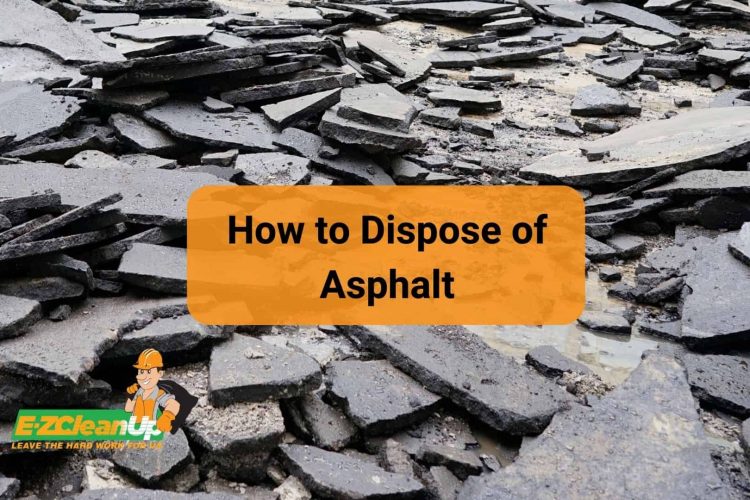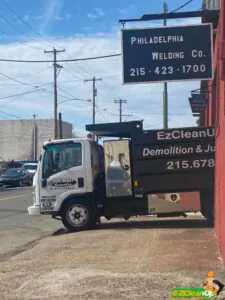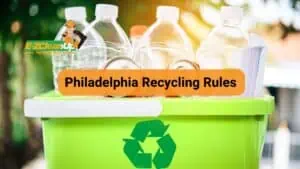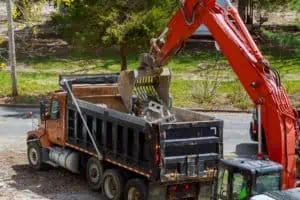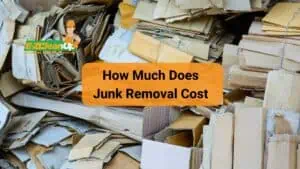Improper disposal of asphalt can lead to significant environmental issues. When left in landfills or dumped illegally, asphalt can pollute soil and groundwater, harm wildlife, and contribute to the degradation of natural habitats.
Here are some of your best choices on how to dispose of asphalt:
- Assess the asphalt type and condition.
- Prepare for disposal.
- Explore recycling options.
- Consider reuse and repurposing.
- Follow landfill disposal regulations.
- Adhere to safety precautions.
- Learn DIY asphalt removal techniques.
- Consider hiring a professional service.
Read on to understand how to manage this process responsibly while keeping environmental and safety considerations in mind.
Assess the Asphalt Material
Before disposing of asphalt, the first crucial step is to identify its type, as different kinds of asphalt require specific handling and disposal methods.
Determine the Types
Asphalt primarily comes in three types:
Hot Mix Asphalt
This is commonly used for high-traffic areas like highways and major roads due to its durability. Hot mix asphalt is manufactured at temperatures between 300°F and 350°F, making it pliable and easier to work with for large-scale paving projects. When disposing of hot mix asphalt, it’s important to consider that it might still contain some residual heat or emit fumes, which need careful handling.
Cold Mix Asphalt
Often used for lower-traffic areas or for temporary repairs, cold mix asphalt is produced at a significantly lower temperature than hot mix, which makes it less durable but more workable at cooler temperatures. It’s frequently used for filling potholes or patching worn spots. Cold mix asphalt can be easier to handle during disposal due to its lower temperature and less rigid structure.
Recycled Asphalt
Recycled or reclaimed asphalt pavement (RAP) is made by grinding up old asphalt and reusing it to create new pavement. Because it’s composed of previously used materials, recycled asphalt may contain a variety of aggregates and bitumen types. When assessing recycled asphalt for disposal, it’s important to check for consistency and contamination, as previous usage can alter its properties.
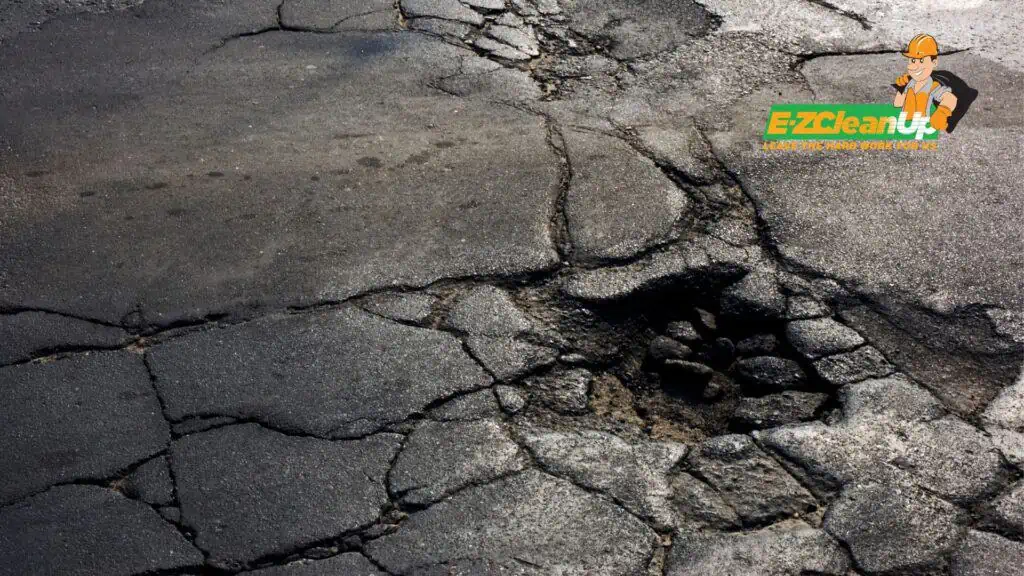
Determine the Condition of the Asphalt
Key conditions to consider include:
Broken or Crumbled
Asphalt that has fragmented into smaller pieces, or crumbled, often due to heavy use or exposure to elements, poses different challenges. This material might be easier to transport and handle, but it can complicate recycling processes as the aggregate sizes and mix consistency vary greatly. When asphalt is in this state, it’s important to assess whether it can be recycled or should be disposed of as waste.
Contaminated Asphalt
Asphalt can become contaminated with chemicals, oils, or other substances during its lifespan. Contamination often occurs in industrial areas or from vehicle leaks and spills. Contaminated asphalt requires careful handling, as it might not be suitable for standard recycling procedures. Disposing of contaminated asphalt typically must adhere to more stringent environmental guidelines to avoid soil and water pollution.
Intact or Slightly Worn
Asphalt that remains largely intact or shows only slight wear might be a prime candidate for recycling. This condition indicates that the structural integrity and composition of the asphalt are still good, allowing it to be reused effectively. This asphalt can often be milled and reprocessed into new paving materials.
Age-Related Deterioration
Over time, asphalt can undergo changes due to aging, such as surface cracking or brittleness. The age and resulting condition of the asphalt can affect recyclability. Older asphalt, while potentially more brittle, might still be recyclable depending on the degree of deterioration and the quality of the original materials.
Preparation for Disposal
Preparing for asphalt disposal isn’t just about organizing the material itself; it’s also crucial to ensure the safety of everyone involved in the process. Gathering the necessary safety equipment is a critical step that shouldn’t be overlooked.
Necessary Safety Gear
Depending on the scale and nature of the disposal task, different types of safety gear may be required:
Protective Clothing
Durable, long-sleeved clothing helps protect the skin against asphalt’s rough texture and any residual heat, especially when dealing with hot mix asphalt. Thick gloves are also essential to protect hands from sharp edges, heat, and potential chemical exposure.
Eye Protection
Safety goggles or glasses are required to shield eyes from dust, debris, and any flying particles during the handling and breaking up of asphalt materials.
Respiratory Protection
When working with older or heated asphalt, harmful fumes can be a concern. A proper respirator or a face mask can protect against inhaling toxic fumes, dust, or small particles that can cause respiratory issues. This is particularly important in confined spaces or areas with poor ventilation.
Footwear
Heavy-duty, steel-toed boots are recommended to protect feet from falling objects and sharp shards of asphalt and to provide a firm grip on uneven surfaces.
Hearing Protection
If you’re using heavy machinery or tools to break up or transport asphalt, noise can be a significant factor. Earplugs or earmuffs are necessary to prevent hearing damage in these environments.
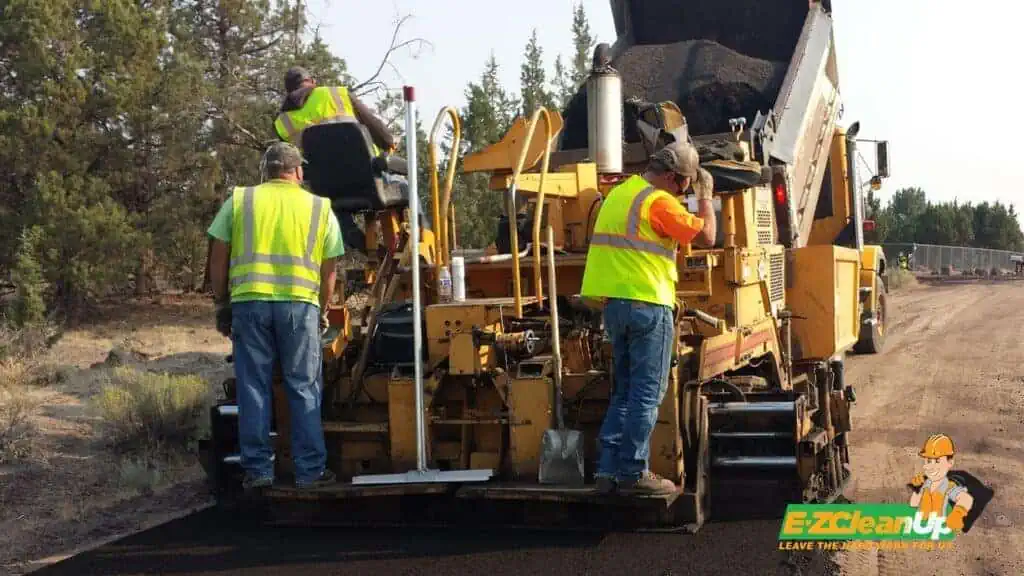
Hard Hats
In environments where there’s a risk of falling objects or head injuries, hard hats should be worn. This is especially pertinent on construction sites or during larger demolition and removal projects.
Additional Gear
Depending on the task’s specifics, other gear, such as heavy-duty tarps for containing smaller pieces, reflective vests for visibility, and sun protection for outdoor work, might be necessary.
Secure the Work Area
Securing the work area is an important step in preparing for asphalt disposal, particularly in public spaces or active work sites. Use cones, barricades, or tape to establish a clear boundary around the work area. Display warning signs or informational posters to alert nearby pedestrians and drivers about the ongoing work. Signs like “Work in Progress” or “Caution: Construction Area” are effective in minimizing the risk of unintended intrusion and accidents.
Make sure that the work area is easily accessible for vehicles transporting the asphalt away and for any machinery needed for the job. Adequate space should be provided for loading and unloading materials safely.
Asphalt Recycling Options
Recycling asphalt presents many advantages, both environmentally and economically. It is a petroleum product, so recycling it conserves precious natural resources. By reusing the old material, the demand for new raw materials like aggregate and bitumen is substantially reduced.
Asphalt Recycling Facilities
Asphalt recycling facilities play a critical role in processing used asphalt into reusable materials. In the United States, several notable facilities lead in asphalt recycling:
Asphalt Specialties Company, Inc.
Located in Colorado, Asphalt Specialties Company, Inc. specializes in turning old asphalt and concrete into new, usable aggregate or asphalt mix, which is then utilized in various construction projects.
California Commercial Asphalt
This facility, with multiple locations in California, focuses on producing high-quality asphalt mix from recycled asphalt pavement (RAP). Their state-of-the-art recycling processes ensure the old asphalt is repurposed effectively.
Laney Recycling Facility
The Laney Recycling Center in Laney, Maryland, offers recycled asphalt products for both commercial and residential use. They provide a cost-effective, environmentally friendly alternative to new asphalt.
Across the U.S., numerous RAP processing facilities convert milled or removed asphalt into a recycled aggregate that is then used to produce new pavement. These facilities are crucial in the circular economy of asphalt, ensuring that the material is reused to its fullest potential.
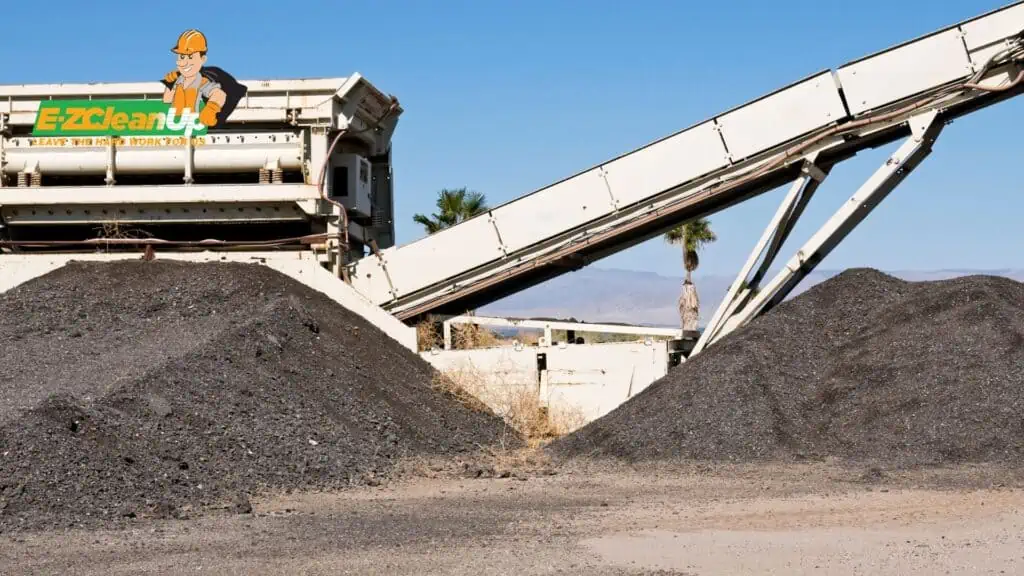
Reuse and Repurpose Old Asphalt
Here are some creative and practical ways to reuse and repurpose old asphalt:
Driveway Repairs and Maintenance
One of the most common uses of recycled asphalt is in repairing and maintaining driveways. Crumbled recycled asphalt can be laid and compacted to fill potholes and mend cracks in driveways.
Pothole Filling in Roads
Recycled asphalt is an excellent material for filling potholes in roads and parking lots. Due to its durability and ease of installation, it’s a preferred choice for many municipalities and private property owners for quick fixes that last.
Creating New Pavements
Old asphalt can be broken down and remixed with fresh bitumen and aggregate to create new pavement surfaces. This new mix often contains a significant percentage of recycled material, maintaining quality while being environmentally friendly.
Building Bike Paths and Walkways
Recycled asphalt is also a great material for constructing recreational paths, such as bike trails and walkways. Its smooth, durable surface is ideal for these applications.
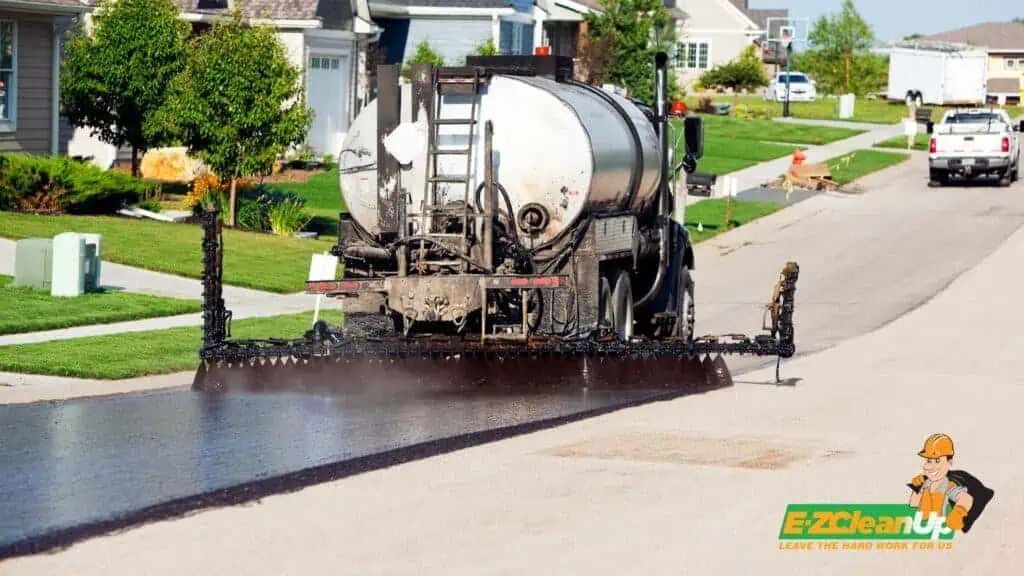
Base Material for Projects
Crushed asphalt can be used as a base or sub-base for various construction projects, including the foundations of roads, parking lots, and even buildings. It provides excellent compaction and stability for any construction work.
Landscaping and Garden Paths
Its natural look and durability make it a suitable choice for enhancing the aesthetics and functionality of outdoor spaces.
Rural Road Surfacing
It’s commonly used for surfacing rural roads, providing a more stable and dust-free surface than dirt or gravel roads.
Temporary Solutions
During construction projects, recycled asphalt can be used to create temporary driveways, parking areas, or access roads. It minimizes mud and dust on-site and provides a stable, temporary surface for vehicles and equipment.
Upcycling Asphalt for DIY Projects
Here are some innovative ideas for upcycling asphalt in your DIY projects:
- Creating Patio and Garden Pathways: Old asphalt pieces can be broken into smaller, flat stones to design unique patio flooring or garden pathways.
- Making Sturdy Edging for Flower Beds: Recycled asphalt adds a neat appearance to your garden and helps prevent soil erosion.
- Crafting Outdoor Furniture: Consider using asphalt pieces to construct durable outdoor furniture such as benches or tables. The weight of asphalt ensures stability, while its weather-resistant quality makes it ideal for outdoor use.
- Building Retaining Walls: These walls are effective for managing soil erosion, creating raised garden beds, or simply adding a distinctive feature to your yard.
- Constructing a Durable Fire Pit Area: The material’s resistance to high temperatures and firmness provides a perfect foundation for safe and enjoyable outdoor gatherings.
Disposing of Asphalt Responsibly
When recycling or repurposing options are exhausted, disposing of asphalt in landfills is sometimes necessary. However, this should be done following specific guidelines to minimize environmental harm:
- Check for Acceptance: Some landfills may not accept it due to space limitations or environmental policies.
- Separate Materials: If the asphalt is combined with other debris (like metal, wood, or plastic), separate these materials before disposal.
- Understand the Fees: Most landfills charge a fee based on the weight or volume of the material being disposed of. Inquire about these fees in advance.
- Transporting Asphalt: Ensure that the asphalt is transported safely. This typically means covering the load to prevent pieces from falling off during transit.
- Documentation: Some landfills might require documentation, like a waste transfer note or a project report, outlining where the asphalt originated and certifying that it’s free from contamination.
Hazardous Waste Disposal Considerations
Asphalt disposal, particularly when it involves potentially hazardous materials, requires careful attention. Asphalt removed from roads or old pavements can sometimes contain hazardous substances like tar, heavy metals, or oils. These materials can be harmful to the environment and human health if not handled correctly.
If there’s a possibility that the asphalt could be contaminated – for instance, if it was part of a roadway with heavy industrial traffic or near areas of chemical spills – testing by a certified laboratory is advisable. This testing determines the presence and levels of any contaminants like polycyclic aromatic hydrocarbons (PAHs), metals, or asbestos.
If hazardous substances are found, the asphalt must be disposed of at a specialized facility equipped to handle hazardous waste. These facilities have specific methods for containing and neutralizing harmful components.
The disposal of hazardous waste is strictly regulated. You must follow state and federal regulations to avoid legal repercussions, which can include heavy fines and environmental clean-up orders. This often involves filling out detailed tracking forms and ensuring the transport and disposal of the material comply with all regulations.
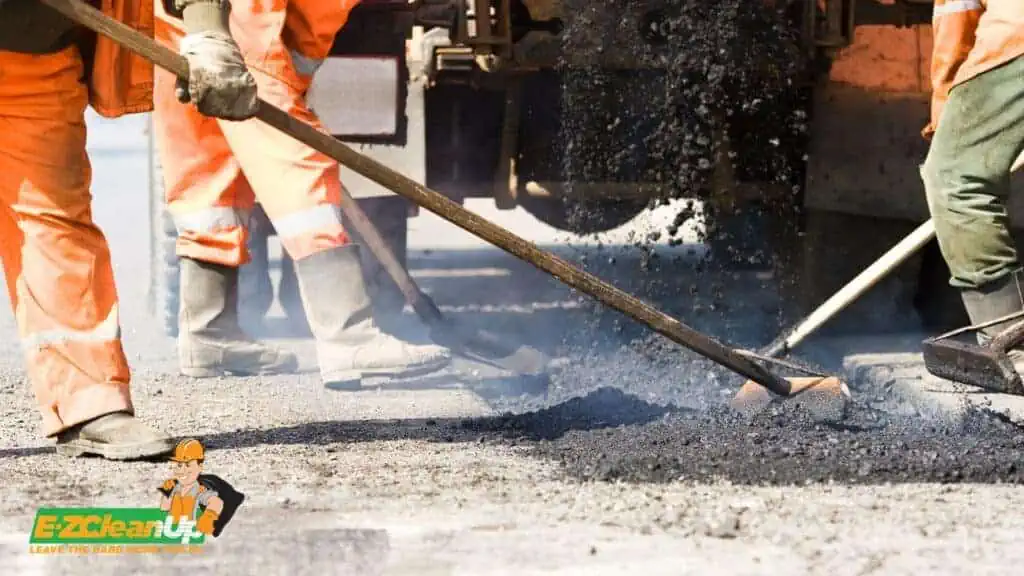
Hiring a Professional Asphalt Disposal Service
When it comes to disposing of asphalt, hiring professional junk removal services like EZ CleanUp comes with several advantages:
- Expertise and Efficiency: Professional disposal services have the experience and equipment to handle asphalt removal efficiently and correctly.
- Safety: Professionals know how to manage risks associated with heavy, sometimes sharp material and have the necessary equipment to prevent injuries.
- Environmental Compliance: Professional services can ensure that the disposal of asphalt adheres to these guidelines.
- Convenience: Removing and disposing of asphalt can be labor-intensive. Hiring professionals saves you from the physical strain and time commitment the task requires.
- Recycling and Reuse: Many professional services offer recycling options, turning your old asphalt into reusable material, which is not only environmentally friendly but also can be more cost-effective.
FAQs – How to Dispose of Asphalt
What Are the Uses of Old Asphalt?
Old asphalt can be repurposed for various uses, such as:
- Roadway Patching and Repairs: Used asphalt can be crushed and reused in new road construction, patching, and repairs.
- Driveway Base or Top Layer: For driveway installations, old asphalt offers a sturdy material base or can be used as a top layer after proper processing.
- Parking Lots and Paths: Crushed asphalt can be a cost-effective option for paving parking lots and pathways.
- DIY Projects: For smaller-scale DIY projects, old asphalt can be used for creating walkways and garden paths or as a foundation for sheds and play areas.
What Is Recycled Asphalt Called?
Recycled asphalt is typically referred to as “Reclaimed Asphalt Pavement” (RAP). RAP involves grinding up used asphalt to a specified size and then reusing it in new asphalt mixtures, road base construction, or other similar applications.
What Is the Difference Between Asphalt and Recycled Asphalt?
The primary difference lies in their composition and usage:
- Asphalt: Typically a mix of asphalt cement (bitumen) and aggregates like sand, gravel, and stones, this is a fresh, newly manufactured material.
- Recycled Asphalt (RAP): This is made from old, removed asphalt that’s been processed for reuse. While it’s environmentally friendlier and cost-effective, its performance might vary slightly compared to new asphalt, depending on the mix and application.
Is Asphalt Toxic Waste?
Asphalt itself is not classified as toxic waste. However, if it contains contaminants like heavy metals or hazardous materials, which can be the case, particularly in older roads or industrial areas, it might be considered hazardous and require special handling and proper waste disposal methods.
Be Responsible When Disposing of Asphalt
Disposing of asphalt requires careful consideration of environmental impact, legal regulations, and safety measures. Whether you’re doing a DIY project or opting for professional help, it’s crucial to follow proper safety precautions and legal guidelines.
For those in Philadelphia and surrounding areas, the task of asphalt disposal doesn’t have to be impossible. EZ CleanUp, a licensed and insured junk removal company based in Philly offers comprehensive services that cater to both homeowners and businesses. Our expertise ensures that your asphalt disposal needs are handled professionally and efficiently.
If you’re looking for a hassle-free way to manage your asphalt disposal, consider reaching out to us. Explore EZ CleanUp’s Services in Philadelphia and make your next clean-up project a breeze.

